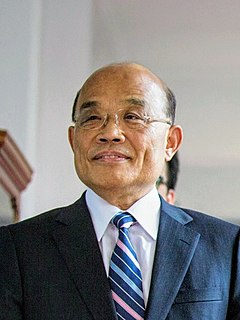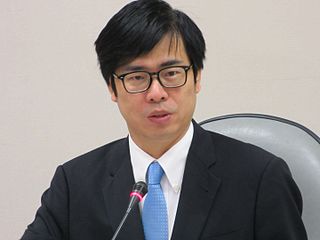The pan-Green coalition, pan-Green force or pan-Green groups is a localist political coalition in Taiwan, consisting of the Democratic Progressive Party (DPP), Taiwan Solidarity Union (TSU), Taiwan Independence Party (TAIP), and Taiwan Constitution Association (TCA). The platform of the New Power Party is also very closely aligned with all the other Pan-Green parties.

The Premier of the Republic of China, formally President of the Executive Yuan, is head of the Executive Yuan, the executive branch of the Republic of China on Taiwan. The premier is appointed by the President of the Republic. The premier does not need to be approved by the Legislative Yuan.
This article aims to give a historical outline of liberalism in Germany. The liberal parties dealt with in the timeline below are, largely, those which received sufficient support at one time or another to have been represented in parliament. Not all parties so included, however, necessarily labeled themselves "liberal". The sign ⇒ denotes another party in that scheme.
This article gives an overview of liberalism in Japan. It is limited to liberal parties with substantial support, proved by having had representation in parliament. The sign ⇒ means a reference to another party in that scheme. For inclusion in this scheme it isn't necessary that parties labelled themselves `liberal`.
This article gives an overview of liberalism and radicalism in Bulgaria. It is limited to liberal and radical parties with substantial support, mainly proved by having had a representation in parliament. The sign ⇒ denotes another party in that scheme. For inclusion in this scheme it is not necessary that parties label themselves as a liberal party.
This article gives an overview of liberalism in Croatia. It is limited to liberal parties with substantial support, mainly proved by having had a representation in parliament. The sign ⇒ denotes another party in that scheme. For inclusion in this scheme it isn't necessary so that parties labeled themselves as a liberal party.
This article gives an overview of liberalism in the Czech lands. It is limited to liberal parties with substantial support, mainly proved by having had a representation in parliament. The sign ⇒ denotes another party in that scheme. For inclusion in this scheme it is not necessary that parties label themselves as a liberal party.
This article gives an overview of liberalism and radicalism in Spain. It is limited to liberal and radical parties with substantial support, mainly proved by having been represented in parliament. The sign ⇒ denotes another party in that scheme. For inclusion in this scheme it is not necessary that parties labeled themselves as a liberal or radical party.
Liberalism in Serbia is limited to liberal parties with substantial support, mainly proved by having had a representation in parliament. The sign ⇒ denotes another party in that scheme. For inclusion in this scheme it isn't necessary so that parties labeled themselves as a liberal party.
This article gives an overview of liberal parties in Brazil. It is limited to liberal parties with substantial support, mainly proved by having had a representation in parliament. The sign ⇒ means a reference to another party in that scheme. For inclusion in this scheme it isn't necessary so that parties labeled themselves as a liberal party.
This article gives an overview of liberalism in Greece. It is limited to liberal parties. The sign ⇒ denotes another party in that scheme. For inclusion in this scheme it isn't necessary so that parties labeled themselves as a liberal party.
This article gives an overview of liberalism in Taiwan. It is limited to liberal parties with substantial support, mainly proved by having had a representation in the Legislative Yuan (parliament).
A congressional caucus is a group of members of the United States Congress that meets to pursue common legislative objectives. Formally, caucuses are formed as congressional member organizations (CMOs) through the United States House of Representatives and the United States Senate and governed under the rules of these chambers. In addition to the term caucus, they are sometimes called conferences, coalitions, study groups, task forces, or working groups. Many other countries use the term parliamentary group—for example, the Parliament of the United Kingdom has many all-party parliamentary groups.
In the history of political parties in China, the first major party in China was the Kuomintang (KMT), which moved to Taiwan in 1949. It was founded in Guangdong Province on August 25, 1912 from a union of several revolutionary groups. The Republic of China was founded by Kuomintang's leader Dr. Sun Yat-sen later that year. In 1921, the Communist Party of China (CPC) was founded by Chen Duxiu and Li Dazhao in Shanghai as a study society, and an informal political network.
The Progressive Party was a political party in the Republic of China from 1913 to 1916.

Chen Chi-mai is a Taiwanese politician and member of the Legislative Yuan. He is also currently the spokesperson of the Democratic Progressive Party and the chief executive officer of the its Policy Research and Coordinating Committee. A physician from Keelung, Chen started his political career by becoming member of the Legislative Yuan in 1996 and served as legislator for almost eight years before becoming the spokesperson of the Executive Yuan.

Chai Trong-rong, sometimes known in English as Trong Chai, was a Taiwanese politician.
The New Tide faction was one of the factions of the Democratic Progressive Party (DPP) in Taiwan before the party voted to dissolve all factions in 2006. The faction initially advocated social democracy, attempting to work with other labor and social movements to influence public policy. The faction also advocated the use of group action to resist the influence of elected officials in the Tangwai and DPP. The faction initially appeared in the form of "domestic Taiwan independence activists", and pushed the DPP to include Taiwan independence in the party charter, to boost their position against the more moderate factions, as well as against World United Formosans for Independence members returning from exile.

The 2018 Taiwanese municipal elections for both mayoral and magisterial candidates were held on November 24, 2018, as part of the larger local elections in Taiwan.






